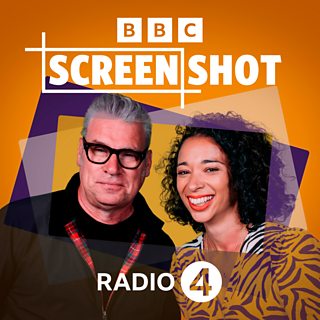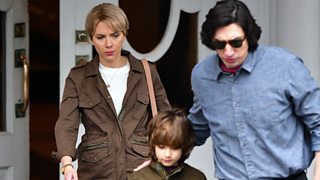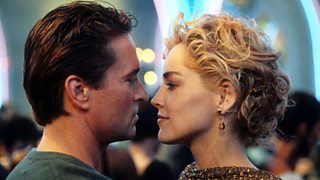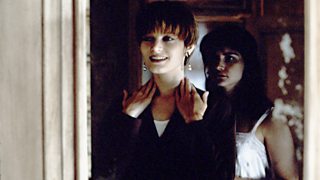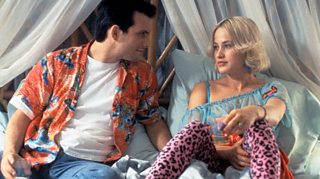Eight of cinema's greatest love triangles
If one's company and two's a crowd, then three must be even more complicated. That's certainly the case with love triangles, the fraught dynamics of which have often been explored in film.
As a trio of love triangle movies – Challengers, Passages and Past Lives – have hit screens in quick succession, Βι¶ΉΤΌΕΔ Radio 4's Screenshot asks what the hallmarks of a good three-way love story are and why the genre holds such an endearing appeal, talking to guests including Passages director Ira Sachs.
Must a love triangle be dark? Is The Notebook a good film? All these questions and more are answered as Screenshot contributor Caspar Salmon runs through eight of the steamiest examples in cinema.

Challengers
Out of the triad of films to deal with love triangles in recent times, Luca Guadagnino’s Challengers is the most attention-grabbing and zeitgeisty. Josh O’Connor and Mike Faist play two young tennis players who fall out over their crush for Tashi Duncan, a determined tennis champ played by Zendaya.
Three-way kisses, emotionally tense matches and some suggestive banana eating ensue, in a film that indulges its every kitschy and/or horny instinct, soundtracked by a pulsating score from Trent Reznor and Atticus Ross that only gets more feverish as the film continues. Challengers presents as a ‘straight’ love triangle, but it’s fair to say that most viewers got rather more into the homoerotic dynamic between the two thrusting boys.
Passages
There is more of a literary feel to Ira Sachs’ Passages, a Paris-set love triangle between a self-involved film director, Tomas (Franz Rogowski), his long-suffering boyfriend Martin (Ben Whishaw) and a young primary school teacher called Agathe (Adèle Exarchopoulos).
From the moment that Tomas begins his love affair with Agathe, we are given to understand that he has a habit of sleeping around, which Martin seemingly accepts. But this time, the young man manipulates both partners, flitting between both to feed his monstrous ego. When Agathe falls pregnant, a reckoning of sorts is clearly on the cards. Sachs’ directing is sensitive and thoughtful and all three actors are on fire in this knotty, intelligent chamber-piece that doesn’t forget to throw in some juicy sex scenes.
Past Lives
“My favourite film of the year,” says Mark Kermode, of this debut by writer-director Celine Song (whose partner, Justin Kuritzkes, wrote Challengers). Song has rejected the ‘love triangle’ label, and you can see why: Nora Moon, her Korean-American protagonist, appears comfortably settled in New York with her boyfriend Arthur (John Magaro) when Hae Sung, a figure from her youth, reappears.
Indeed, it’s unclear whether any sort of romance with this past flame is really on the cards at all. But Song borrows from the love triangle format to show a protagonist who is torn between past and present; between the comfortable and the unknown. That tumult yields a rich, soulful performance from Greta Lee as Nora Moon, ably code-switching between two worlds that Nora cannot reconcile.
Jules et Jim
Friends and then bitter rivals Jean-Luc Godard and François Truffaut both had a stab at the love triangle: Godard with Bande à part (1964) and Truffaut two years earlier with Jules et Jim, one of the key texts of the Nouvelle Vague. This film, made while France was still rebuilding in the wake of WW2, takes place around the first world war. Its protagonists are Austrian (Jules) and French (Jim) – two young artistic friends who both become involved with the magnetic, mercurial Catherine (Jeanne Moreau, in a career-defining role).
Catherine – “who is neither Jules nor Jim” in Ellen’s deadpan assessment of the movie’s gender politics – is the beating heart of a film that adopts a curiously lighthearted tone to approach an emotionally freighted story; the modernity of the triangle is eye-catching, and Truffaut ably uses the format to reflect on a shifting Europe.
Casablanca
Some may argue that Casablanca is more of a two-way love story between Ingrid Bergman and Humphrey Bogart, with an interloper thrown into the mix (played by Paul Henreid, “a very boring actor” according to Screenshot contributor Anne Billson), than a love triangle proper. Not so! Once again, war forms the backdrop for a love story touched by tragedy.
In 1942’s Casablanca, the dangerously shifting politics make the romance at its heart all the more poignant, because Rick (Bogart) and Ilsa (Bergman) are not masters of their own destiny. The film asks whether humans can salvage some semblance of dignity, of beauty, from the ills of history. So it is that bar owner Rick must face unbearably tough decisions when the love of his life, who he never imagined to see again, walks into his joint with her husband.
Damage
Louis Malle’s late-career movie, 1992’s Damage – an over-the-top, overcrammed melodrama with “one of the funniest death scenes of all time,” according to Kermode – fits into both the love triangle category and the trend in the 80s and 90s for erotic thrillers and dramas, often featuring disturbed women who ransack the lives of poor, poor men who didn’t ask for an insanely hot woman to seduce them away from their easy existence!
In The Graduate we see a love triangle where one person represents order and convention, and the other is strictly taboo.
In this case, Jeremy Irons is the middle-aged politician who simply cannot help himself from acting on his attraction to Anna (Juliette Binoche), who unfortunately happens to be his son’s girlfriend. A lot of gymnastic, not very jolly sexual intercourse then follows between these two souls, leading to tragedy and chaos. Once again, the triangle represents disorder here; a bewitching, dangerous invitation to risk it all.
The Graduate
Another family-based love triangle, this time with a young man (Dustin Hoffman) caught between a young woman and her mother – the Mrs Robinson of legend, played by a sublime Anne Bancroft. Hoffman plays Benjamin Braddock, a young graduate who embarks on an affair with an older woman, only to then become involved with, and get engaged to, her daughter.
Once again, we see a love triangle where one person (Elaine, the daughter) represents order and convention, and another (the older, sexually permissive woman) stands for a taboo, a glimpse into a disordered world. Mike Nichols’ 1967 comedy-drama – sharp as a knife, funny, modern and beautifully soundtracked by Simon & Garfunkel – helped to herald a new era of American cinema.
The Notebook
Whatever you may think of The Notebook’s slightly gloopy tone and lachrymose tendencies, there’s no denying that the film has endured far longer than might have been expected when it was released in 2004, becoming a modern cult classic.
Producer Lynn Harris suggests that the film’s continued appeal may be due to “the idea that the world and life are not quite as simple as we’d like it to be”. The film’s success is also surely due to two fiercely committed leads, Ryan Gosling and Rachel McAdams, generously giving their all to this Nicholas Sparks adaptation. Once again, war forms the backdrop of a seemingly tragic love story between two people torn apart by conflict. James Marsden features as Lon, a no-hoper throwing a spanner in the works, because, well, it wouldn’t break your heart if they got together too easily, would it?
Discover more about cinema's fascination with love triangles by listening to the episode in full.
More articles from Screenshot
-
![]()
Nine of the most explosive divorces in cinema
The acrimonious ways movie couples have split up on screen.
-
![]()
Why did the erotic thriller run out of steam?
Mark Kermode and Ellen E Jones explore cinema's steamiest genre.
-
![]()
Seven of the most memorable interlopers in cinema
The unwelcome guests who have inveigled their way onto our screens.
-
![]()
Seven of cinema's most memorable outlaw couples
On the trail of the law-breaking lovers who lit up our screens.
